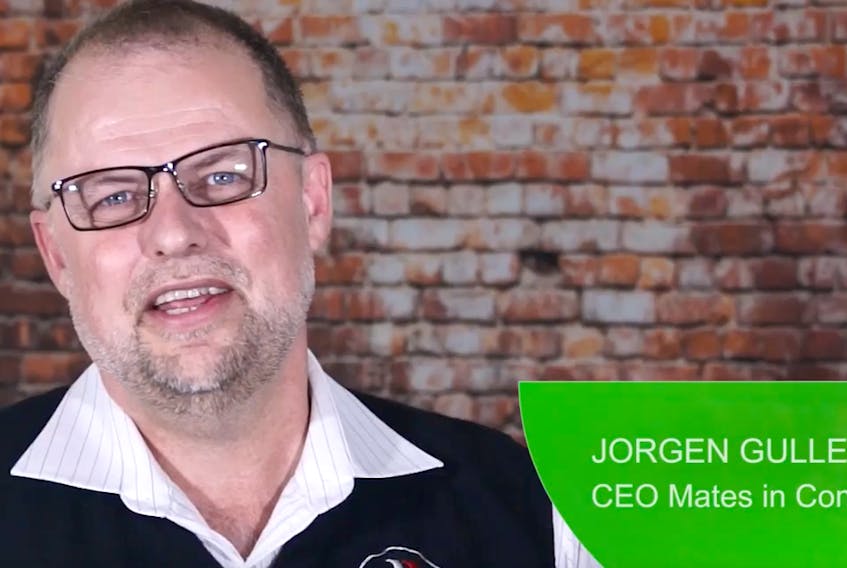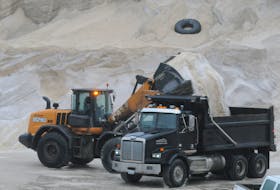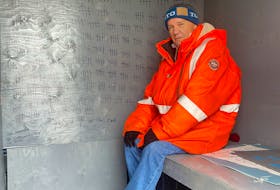ST. JOHN'S, N.L. — Barb Sweet
The Telegram
Jorgen Gullestrup was a teenage plumbing apprentice in his native Denmark when he began struggling with depression.
“I tried to take my own life,” he said during a phone interview from Queensland, Australia, where, after successful treatment for his mental-health struggles, he immigrated several years later.
In his new country, he became a construction industry union leader and saw workers lost to suicide.
“Each time that happened, you can’t help thinking it could be your family,” he said Thursday, as he prepared to head to the airport bound for speaking events in St. John’s.
Harkening back to his supportive employer in Denmark and the second chance he got, Gullestrup joined with others who wanted to create change in the Australian construction industry. They raised funds to get university researchers to investigate the incidence of suicide rates in the industry.
Six workers were lost to suicide for every fatal accident, Gullestrup said.
Efforts to tackle the crisis led to the formation of the MATES in Construction, whose mission is to be Australia’s leading industry suicide prevention organization. It is independent of industry and unions.
And while Gullestrup, the CEO and founder, is careful not to make any claims the organization is directly responsible for a drop in suicide rates, he acknowledged it’s definitely helping.
The MATES in Construction program includes awareness campaigns, intervention training, a 24-hour suicide hotline and grief counselling.
On Wednesday, Gullestrup will be the keynote speaker at the Newfoundland and Labrador Construction Safety Association’s annual health and safety conference.
The association noted Gullestrup will also deliver mental-health/suicide awareness training for other organizations while he is in St. John's, including the Canadian Mental Health Association–NL. He will also meet with industry leaders to discuss how the MATES in Construction framework might be adapted in Newfoundland and Labrador, which has an economy geared toward long-distance commute/turnaround shifts on major construction projects, as well as the oil and gas industry.
Gullestrup noted risk factors for construction workers include the long hours of work as well as isolation from home and the feeling of being disconnected.
“It’s very much you’re away three or four weeks, your family goes on and you come home, and they have moved on by three weeks. You are bombarded with all these issues and arguments and it’s time to go back to work just as you’re fixing it up. That just accumulates,” he said.
Legislative initiatives taken in Australia include shortening the work rotation for the construction industry, he said.
The nature of a male-dominated industry and the reluctance of men to seek help resonated with Gullestrup as well, as he recalled going through a situation, handing out pins with a helpline phone number on it, and being sad and upset himself at night.
“I hung up three or four times before I had the guts to stay on the line. Asking for help is really scary,” he said.
A large part of what the organization focuses on is recognizing in a workplace when a worker needs help and connecting with them, rather than expecting them to seek help on their own.
“The issue we need to recognize is it’s everyone’s issue, from workers to management to government, to develop interventions. The workers’ role is to start changing that, so they care for each other and be more proactive,” said Gullestrup, who has a master's degree in suicidology and is working toward a PhD.
Other things that can help include making sure there is good communication technology in camps so workers can stay in contact with their families.
Additional focus
Health and safety programs have previously focused solely on physical injuries, and more than 20 years ago there was an emphasis put on improving the work culture and dispelling the notion that people who pointed out hazards were complainers.
People feared being laid off if they spoke out, recalls Jackie Manuel, CEO of the construction safety association.
But through education, the culture surrounding physical safety has been turned around.
Now it’s time to dispel those concerns when it comes to mental-health issues in the workplace.
Through work with Memorial University’s Safety Net research project, Manuel said, it became evident there has been an issue here for some time that nobody was talking about.
“It was time for us to see what we can do to raise awareness about this important issue,” she said, noting the boom/bust cycle with its financial pressures are other contributing risks for suicides and suicidal thoughts among industry workers.
The association contacted Gullestrup and, with the support of industry partners, arranged to bring him to the province.
“We are extremely hopeful while Jorgen is here there will be some conversations with industry leaders to see what we can learn from what they have done, what we may be able to copy. We don’t need to reinvent the wheel,” she said.
Every group the topic has been raised with has had someone who was touched by a suicide, she added.
MUN sociology professor Barbara Neis, a lead on the SafetyNet Centre for Occupational Health and Safety Research, said she’s also hoping for momentum and sustained attention on mental health as a part of health and safety programs and training.
It’s also been a neglected area of research in the past.
“There’s a lot of work to be done here,” said Neis, project director of the national, multi-year research On the Move Partnership on mobile work.
Sara Dorow, chairwoman of the department of sociology at the University of Alberta, is part of a research project that builds on work done through On the Move.
Dorow — featured in a documentary, “Digging in the Dirt,” that focuses on addiction and mental-health issues in the oilpatch, and project research partner on mobile or fly-in, fly-out work with critical incident stress management intervener Val O’Leary — said showcasing the Australian example is important for industry audiences.
Preliminary results on the new study are expected around June.
Dorow noted Australia has already put a lot of research and energy into policies regarding mental-health issues for fly-in and fly-out workers and construction workers.
In the course of her research, she has uncovered the stories of people affected by the suicide of someone close to them, as well as workers suffering stress-related illnesses or deaths.
She has also found that there are people who fill a role, informally, as a go-to person for co-workers, similar to the MATES in Construction model.
“The need is clearly there,” she said. “We can’t overemphasize enough the need for having this conversation.”
Dorow said a need for policy change is also clear, noting the mistrust of those who fear that if they go for help it will come back to bite them.
A third-party organization like MATES in Construction would protect workers who have that concern, she said, although how workers feel varies according to supervisors and companies based on the stories being shared with the researchers.
As for Atlantic Canadian workers, the rotation system can have a more pronounced impact because they have such a strong connection to family and home. So, when they’re unable to fly out because of the distance, or have longer work rotations, the feeling of isolation can be more pronounced.
There is also a ripple effect on their families, Dorow said.
"(Something like) MATES in Construction could make a difference not just for the workers, but also for their support systems,” she said.
Details on how to register for the association’s conference Wednesday and Thursday at the Signal Hill campus of MUN can be found at http://www.nlcsa.com/. There are limited spaces left.
The website for MATES in Construction is http://matesinconstruction.org.au/.
@BarbSweetTweets









